"He has made everything beautiful in its time. . ." - Ecclesiastes 3:11
Don't wanna be here? Send us removal request.
Text

Important Announcement
Hello to my Tumblr followers and to anyone who happens to stumble across my humble little blog. Thank you for following and for finding me! I hope my thoughts and art have brought something beautiful and meaningful into your lives. It is with a bittersweet heart that I must now bid you farewell. I will no longer be posting or active on this Tumblr. If you love my art or desire commission work you can visit both my website and Patreon, as well as write me at my email. I would be happy to hear from you!
Patreon: https://www.patreon.com/dpillustrations
Website: https://www.dpillustrations.com/
Email: [email protected]
I hope my art continues to spread through many likes and reblogs, thank you for the love! I hope you are well wherever you are and that God bless your lives. His love be near to your heart.
2 notes
·
View notes
Link

#patreon#Patreon Update#patreon artist#patreon creator#surreal art#surrealism#surreal artist#science fiction#concept art#illustration#illustrator#christianity#bible#biblical#john the baptist
1 note
·
View note
Photo

Curio Cabinet: Unrelenting Sun. 2020. Danielle Pajak Illustrations.
#curio cabinet#spock#star trek#vulcans#surreal art#surrealism#surrealist#concept art#illustration#long beach artist#dpillustrations#patreon#patreon artist#sci fi#science fiction#sci fi art
1 note
·
View note
Link

#patreon#patreon artist#patreon creator#october#art#illustrator#freelance artist#surreal art#surrealist#surrealism#infinity's end#medium#medium writer#dpillustrations
2 notes
·
View notes
Link

#the drum symbol#alexis p johnson#indie author#indie pub#indie publishing#lebanon#beirut#lebanese#historical fiction#dpillustrations#illustrator#graphic design#book cover#patreon artist#patreon creator#patreon#ireland
4 notes
·
View notes
Link

#patreon#patreon artist#patreon creator#Patreon Update#september#dpillustrations#infinity's end#curio cabinet#freelance artist#freelance illustrator#surrealist#Surreal Art
4 notes
·
View notes
Link

#august#dpillustrations#patreon#patreon creator#patreon artist#freelance artist#freelance illustrator#surrealist#patreon update#infinity's end
3 notes
·
View notes
Photo

"And in the fourth watch of the night he came to them, walking on the sea." - Matt 14:25
Fourth Watch. Danielle Pajak Illustrations 2020.
#fourth watch#surreal art#surrealist#scripture#COVID19#quarantine thoughts#isolation#dpillustrations
2 notes
·
View notes
Photo

This has been a tough yet very empowering week, so I want to end it by putting something positive out into the world. I was going to wait for this to be revealed a little closer to the time that I launch my fundraiser, but here it is! This is the cover for my second novel, THE DRUM SYMBOL. It will be the centerpiece for my fundraiser for Lebanon as it features a Lebanese MC. 😊 I will be giving more details once the book is published and available in early September. TGIF!
Artwork and design by @dp.illustrations
#WatchThisSpace #CoverReveal #ComingSoon #Bookstagram #AuthorsOfInstagram #indieauthor #indieauthorsofinstagram #writerslife #writers #amwriting #amreading #bookart #originalart #books #historicalfiction #Irish #Ireland #Lebanon #Beirut #Lebanese #Phoenicians https://www.instagram.com/p/CEcsM6Opxtz/?igshid=qioaontgyop4
#The Drum Symbol#indie author#indie publishing#cover reveal#lebanon#ireland#historical fiction#book art#dpillustrations
4 notes
·
View notes
Text
Adoration - The Short Film
“After being wounded by hunters, a vampire takes shelter in a secluded desert mission where he and a newly veiled nun find themselves stuck together for the night and share an enlightening conversation.”
After over a year of waiting, and intense edits, ADORATION is finally here! This short film was written and produced by myself in collaboration with a talented cast and crew here in my home state of Arizona. I hope one day to make it into a full-length feature! So please support indie film by giving this a thumbs up and sharing. Thank you for watching!
youtube
#vampire#vampire lore#gothic stories#gothic#short film#Adoration#indie film#indie filmmaking#indie filmmaker#Arizona#dpillustrations
16 notes
·
View notes
Text
Thoughts on A Bohemian Rhapsody. . .

I know this film is pretty controversial for many reasons, but watching it gave me a lot to think about and I was especially drawn to one point in particular -
Although, first I just have to get on the Rami Malek obvious train - he was absolutely amazing. It was so surreal watching him because even if I am not familiar with Queen or Freddie Mercury, I didn't think of Rami as Rami - but just Freddie. It was like the spirit of Freddie Mercury took possession of him and he was performing his own life. It was a weird, but fascinating experience!
So yes, Rami deserves all the awards!! - ahem - but back to what I was going to mention. Even though I am not a fan of Queen, watching this film did make me understand why Queen was (and is) so well loved by many. Despite my many issues with the film, it did give me a deeper appreciation and desire to know more about Queen, Freddie Mercury, and their music. Because in a lot of ways I could very much relate to Freddie and the band - on a creative level. It was that thrill of pure creation, that freedom of letting your muse take you where it will - and if that includes weird opera bits and six minute long songs so be it! Of how their music spoke to the outcasts, and to the creative outcasts, and I really sensed that aching, angsty artist spirit. This world is rough on the sensitive ones who walk another road and can hear music from another realm...
And for me, that is something that we should remember. This film seems to paint a picture that Queen's success and audience resonance was inevitable, and maybe it was, but in real time, that isn't how it is for the artist. As Freddie boldly states to that one studio manager, Ray Foster, that he would be forever known as the guy who lost Queen, we, as the audience, feel the crushing declaration of such a statement and happily watch as Queen victoriously and seamlessly create their musical hits and become one of the most successful bands ever. That confidence is admirable and I believe necessary for any artist, as we should all create with such tenacity and boldness as a blazing Freddie Mercury, but in reality there is no guarantee of having such success or that you'll even speak to any kind of audience at all. Ray Foster's objections to Bohemian Rhapsody are very real and practical objections that anyone in show business makes, as they hesitate to shake the boat and take those creative risks. The world is run by these people, and it is run by money, and nothing you do and create, no matter how deep and how true it is, is guaranteed to go any further than your own livingroom.
My point being. after my long preamble, is that if in any way Queen and Freddie Mercury's story inspires you, please consider to remember the outcast artists - the people creating the weird, bizarre, uncomfortable things that look and sound like nothing else you have seen or heard before. Because executives and managers like Ray Foster are only thinking about profit and gain, and while it is easy to get angry at "the Man" (which I do A LOT), in many ways they cannot be blamed for only trying to keep the world going round. Instead we should ask ourselves, where is this source of "profit" coming from? Who are the Ray Fosters of this world considering when they judge which idea, song, film, visual style, etc, gets to be funded and put into the limelight?
The audience.
You.
We, and all of us who are "the consumer". It is in our hands where the true power lies when it comes to giving the Queens of this world a chance to speak and resound throughout history. So we all enjoy hating "the Man", but have you ever considered how your own pocket book speaks to what gets the most attention? In the film Freddie Mercury felt that symbiotic relationship with his audience, and felt a deep connection to them, as a performer, wanting to become what they wanted him to be, or needed him to be - and in many ways, that connection between audience and artist is a very true and intrinsic reality. The artist does not create from the vacuum or into the vacuum, and the audience cannot experience the vestiges of that otherworldly realm that the artist straddles - one foot there, one foot in reality - which brings beauty and meaning into their lives. Both are necessary to allow art, in all its myriad of forms, to speak, to flourish, and to grow!
Now, of course, we all can love what we want to love, and enjoy what we want to enjoy. I'm not putting or wanting to put any kind of guilt or burden on anyone in this regard, but what I am wanting to do is to challenge you, and ourselves, to consider thinking outside our own boxes every now and again. Instead of disregarding something outright because it isn't your usual thing you love, or you don't understand it, or it looks strange and bizarre, maybe think about giving it a second chance? Pause, look deeper, listen harder, and consider. Be curious! Be kind! You never know what gems and beauties you'll find if you do, and better still, you never know how deeply and profoundly this will speak to the artist who has just put his heart and soul into this created thing. Every artist is speaking to you, to us, to the world - and I do not see how there can be any harm - only supreme benefit - in stopping for just a moment in the busyness of our lives to just listen and look for awhile. You never know, maybe you'll discover the next Bohemian Rhapsody!

6 notes
·
View notes
Photo

1969 cover art by Mitchell Hooks, for ‘The Fortec Conspiracy,’ by Edmond G. Addeo and Richard M. Garvin
1K notes
·
View notes
Photo

My new profile pic by Maribel Navarro La Cococita
Instagram: @ the_search_for_silence
3 notes
·
View notes
Text
Happy #THANKYOUPATRONS Day! ٩(^ᴗ^)۶
Danielle Pajak Illustrations

2 notes
·
View notes
Text
Once Upon a Time in Hollywood: My Thoughts

I feel compelled to record my experience watching Tarantino’s latest film. I haven’t been keeping up with the latest news and controversies about the film, so you must forgive me if I speak like I am out of the loop, because I literally am. On top of that, I didn’t even know what the Manson Family Murders were until I decided to go watch this movie. (History isn’t my strong suit.) Reading the history of this terrible tragedy was mind-blowing and awful. I simply had no idea something at this level had occurred which had such a significant impact in Hollywood and America at large.
I’ve also not seen a Tarantino film in a long time. The last movie I saw of his was Django Unchained in theaters, which I enjoyed. I am not studious of his filmography, by any means, only having seen Inglorious Bastards besides Django. I respect and admire his abilities, which are exceptional, but I would not necessarily call myself a Tarantino fan.
I say these things so as to give some context for the complex thought process I had about this film. Namely, there are three levels to my experience: what I experienced personally while watching it, what I thought Tarantino was communicating through this film, and what Tarantino actually was communicating through this film. They seem to be contrary, but also interwoven at the same time.
The first section of the movie that takes place over those two days where we follow Rick Dalton and Cliff Booth (and intermittently Sharon Tate) through their lives was the section of the film that spoke and moved me the most. I thought it was absolutely genius, powerful, and resonate. I was shocked at Tarantino’s subtlety - I wouldn’t have even known I was watching a Tarantino film! I mean he always wrote intense and complex dialogue for his characters, but this soaking in the lives of these three characters - methodical, intentional, with immaculate visuals (everything GLOWED with color, texture, and 60s aesthetic!) - is something I would not have come to expect from him. I thought I was watching some cerebral high art film! Yet once the movie fast forward those six months when Rick and Cliff come back to Los Angeles and we collide into that explosive climax, the mood and attitude of the movie changed. I was like, “Oh. Oh Yeah. This is a Tarantino film.”
Yet, even still, in my mind I was trying to make sense of all the events and how the violent climax fit within the context of the film. It was a friend, who had watched the film with me, that pointed out that we were supposed to relish or enjoy the violence done to the Manson family – thus why it was so gratuitous in its application. That was like a record scratch moment for me. We were supposed to enjoy that?? To me that did not make sense to what Tarantino had built in the entirety of those first two days!

Rick Dalton to the rescue! Gotta love me a problematic disaster son! 🥰
Namely, what I thought Tarantino was painting was a satirical, but resonate commentary that was an indictment against Hollywood and the idealism of that time period. I thought he was making a statement about the classicism, cronyism, sexism, and racism that was going on behind the scenes – behind the gloss, glamour, and the machismo of those who were the most powerful in the industry. I thought he was making statements that the Manson Family murders were birthed from out of that self-entitlement culture and, perhaps, the demonisation of the hippie movement. I mean the Manson Family depicted in the film were such caricatures, and I thought that was intentional – especially within the context of the whole spaghetti western motif – which I thought was being used to highlight this idea. This idealized and simplistic concept of “good and evil” - the roguish American cowboy vs the mustache twirling villain - our swaggering heroes vs the deranged hippies! I saw him as setting up Cliff Booth and Rick Dalton as examples of how America perceived (perhaps still perceives) itself, as he and Rick Dalton become the heroes in the end – but heroes made from Hollywood’s delusions of grandeur. The gratuitous violence a way of exemplifying the absurdity of it all, especially at the end when Rick Dalton is talking to Jay Sebring. The both of them have a casual and neighborly conversation about almost being murdered in their beds and Rick Dalton using a flame thrower on one of the girls. It is darkly comedic, but I thought that was the point.
Moreover, if we look at the characters of Rick, Cliff, and Sharon Tate specifically, they aren’t depicted in a heroic light. I understand that Tarantino creates morally grey “heroes” in his films, but within this movie the context is different. As I said, I believed it to be an indictment against the Hollywood elite – the rich and famous living their lives completely out of touch with reality and the people around them. Sharon Tate is depicted as ditsy and oblivious, such as with Jay Sebring (the man she was previously engaged to) hanging around because he is still in love with her. She goes around dancing and smiling and laughing as if she is a 60s maiden in a flower child’s dream having not a care in the world. Rick Dalton is basically a petulant manchild and drama queen who throws temper tantrums, drinks himself stupid, and doesn’t even fully appreciate that his friend is basically his Mom, taking care of him and making sure his life remains easy. Cliff Booth is a little more alarming of a character, as it is heavily implied that he did kill his wife, an arrogant loner type who seems kind of like a psychopath. Then we are given that lovely scene where he is driving Pussycat back to the ranch, and she offers to perform oral sex on him while he is driving. Cliff Booth refuses, but he refuses on the terms that she is underage! This implies two things, 1. He is only opposed to her doing this because it could literally land him jail. (Huh! Not for any other reason, Cliff? Like maybe it being morally depraved??) And 2. If she were 18 then it would have totally been fine! (Yes, my dear, you can’t perform oral sex at 17 on a complete male stranger in a car, but one year later it’s totally legit!) Cliff Booth is kind of a douchebag. What a knight in shining armor to come to the rescue of Sharon Tate in the end, right?
All of these character traits and moments as we watch these three characters go about their lives, I saw as intentional – that we weren’t supposed to be rooting for them (necessarily), but it was a disparaging (but definitely not unsympathetic) look at the time period, 1960s Hollywood, and its royalty!

One thing that stood out to me was the foot imagery in this film. It was very intrusive visually and in your face. There were characters propping up their feet and jutting out at their feet at the audience. To me the connotation was negative. It gave me the impression of carelessness, arrogance, childishness, flippancy - these feelings further exemplifying this idea of self entitlement of the characters depicted.
Now, with all this being said, as I mentioned, I also had my own personal experience while watching this film. As I was watching Tarantino paint (as I perceived) this damning image of America, Hollywood, and society’s elite – I did not feel anger or repulsion or cynicism, but I was overflowing with love and compassion. I pitied these people, and I was drawn into their very real and deep issues as human beings. That is why I loved the first two hours of the film, because I saw him as showing them as they were - human. The Hollywood “elite” aren’t these idealized, unapproachable, untouchable “gods and goddesses”, but real men and women who struggle with insecurity, emptiness, existential dread, selfishness, violence, and arrogance. They are people who desire to be loved, to have that validation and affirmation from others. They are people who hold darkness and ugliness in their hearts and have no outlet for truly understanding it. My favorite moment of the movie was when Rick was talking with the little girl Trudi, and over the course of the conversation she completely disarms him and turns him into a blubbering mess, as he begins to realize through the connection of the Eazy Breezy novel that he was reading how much he can relate to the character and his own fading sense of self-worth and loss of purpose in his life and career. Not only was the moment clever, but it was poignant and powerful, and spoke to the humanity within Rick. This is lovingly climaxed in the scene where she whispers to him that he did the best acting she had ever seen. My heart! 🥰
There are plenty of other examples of the characters humanity – such as Sharon Tate sitting in the theater basking in the validation and joy of the audience responding to her role in the movie or even a scene where we just watch her sleep and snoring for a bit. Then of course we come to feel for the friendship between the characters of Rick and Cliff, as it is shown to be genuine and relatable, and we – somehow, despite it all – are rooting for them, feeling for them, and empathizing with them. We do want them succeed in some absurd sense, because these characters are neither gods or devils, but are humans. They are us. And I thought that was so beautiful.

“When you come to the end of the line, with a buddy who is more than a brother and a little less than a wife, getting blind drunk together is really the only way to say farewell.”
However, as we come to the grandiose and violent climax, I begin to see that there is a different melody within the narrative – namely the fact that we were supposed to be cheering on as Cliff smashes a young girl’s face in and Rick torches a young girl alive. (Yikes! To me that is just so ugly and wrong, but sure, Tarantino - you do that!) Essentially, this is a Tarantino film complete with his quintessential revenge fantasy – revenge against the Manson Family for the lives they had taken in such a horrific and brutal fashion.
I ended up listening to a Podcast interview that Tarantino did with Empire (Listen here), and in it he was describing some of his thought processes while creating this film. He described this film as “metaphorically saving Sharon”, and how he had such a strong connection to the very last shot – where we see the four survivors alive, Sharon inviting Rick into her home. He used words such as “touching” and “emotional”. I realize now that he was literally doing what the title of this film implies – telling a fairy tale! It is revisionist history all for the purpose of trying to metaphorically right a terrible wrong. In the interview, he describes it as “cathartic”.
Now, I should have understood this from the beginning considering Inglorious Bastards dealt with revisionist history and Django was a story that was very much like a fairy tale. However, in my opinion, those concepts worked far better in those films, flowing more naturally from their narratives. Whereas it felt oddly placed within this sprawling and ambitious story, which for the most part, didn’t seem to be depicting a Hollywood that you would get all warm and fuzzy about. And while I don’t believe his depiction of Sharon Tate was completely negative, it definitely wasn’t positive or flattering. He describes her as a “friendly ghost haunting the movie in a lovely way”. That wasn’t the impression I got from the film while watching it.
Now, I am all for artists doing what they do, telling the story they want to tell, and it seems like Tarantino is an ardent fan of Sharon Tate and the movie The Wrecking Crew that she starred in and was depicted within this film. I can understand how personally he would feel a sense of catharsis in trying to save her, as well as bringing her killers to justice - or at least his version of justice.
I am also all for the old westerns and the fun, campy heroism depicted in the shows and films at that time period. (I mean I am a huge fan of the original Star Trek after all.) I believe there is a lot that is positive about those times, and valuable things that we have forgotten that we would do well to remember again. There is always the good and the bad in every age. However, Tarantino’s vision for this film feels pretty shallow within the context of history and comes across as self-indulgent and out of touch. Not that some of that is wrong, per se, all artists are self indulgent in one form or another, but it kind of leaves me feeling like: “That’s it? That’s really what your 3 hour epic film was about?” Seems rather anticlimactic and not to mention emotionally immature. To take “revenge” in that gratuitous fashion is not “justice”, but is juvenile and morally reprehensible in of itself. Brutalizing killers who brutalized others isn’t how we go about righting wrongs, but actually perpetuates that very violence that one wishes to eradicate. Obtaining catharsis from mutilating human beings isn’t exactly what I would be encouraging creators (or film goers) to aspire to. I think we should always strive for higher thoughts, self betterment, and emotional maturity - most especially in our art and storytelling.

“Brothers, do not be children in your thinking. Be infants in evil, but in your thinking be mature.” - 1 Corinthians 14:20
Now, despite what may be coming across, I do actually still love this film - well most of this film. I found it to be an immersive and stimulating experience, and it is obvious that Tarantino wanted to get across the humanity of his characters and tell a story that would be emotionally affecting. I do think it is the best work Tarantino has done, and could very well be considered his magnum opus. And it certainly has given me a lot to think about. Perhaps despite Tarantino not telling a more thematically rich story, it would instead spark thematically rich discussion, which could be almost just as good.
6 notes
·
View notes
Text
A Discourse on Communication and Storytelling Part II: The Idealization of Nihilism
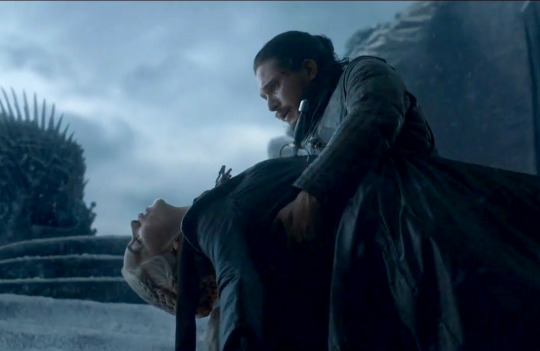
In my previous post, I outlined the flawed narrative structure of the conclusion of Game of Thrones. I focused primarily on Daenerys and how her story did not communicate effectively what Benioff and Weiss were wanting to accomplish with her, i.e. her becoming “Mad Queen” Targaryen. I then asked what it was that they did communicate through her story. Here is where I would like to begin.
As an artist and visual storyteller, I have become exceedingly grieved and disgusted with a lot of the stories in our entertainment today. Every one of my favorite shows one right after another ended in disappointment for me. I asked myself, why? Why were all these amazing shows, many of whom have exceptional talent working on them, crashing and burning, in my less than humble opinion? I believe the answer is multi-faceted, but I am going to zero in on one aspect for the sake of time and my argument. In short, cynicism and a nihilistic world view have poisoned the storytelling landscape.
I mean I get it. You only have to open your social media or major news page and you can find tons of reasons to bemoan the state of our society, our country, and the world. I understand the disappointment, the bitterness, the seething rage – I get it! I have felt it myself! I know precisely how everyone is feeling because I am feeling it too. I know that feeling of being utterly useless to help or stop any injustice or wrong from happening. The struggle is real.
However, the struggle is not all there is, and I believe that is the crucial thing to remember because something much more sinister than our own despair is happening, which is that we are coming to love our despair. Our bitterness and anger is becoming a part of how we are defining ourselves every day. Suddenly instead of these ideas and attitudes being recognized as the poison that they are, we drink it like it is sweet nectar. And to me that is exceedingly more grieving than feeling negative emotions in of themselves. We all feel negative emotions, we all feel the pain of life to one degree or another. This is a part of life, but to actually redefine and look upon those attitudes and thoughts as beneficial, glorious, and wise? That is the truly terrible thing.
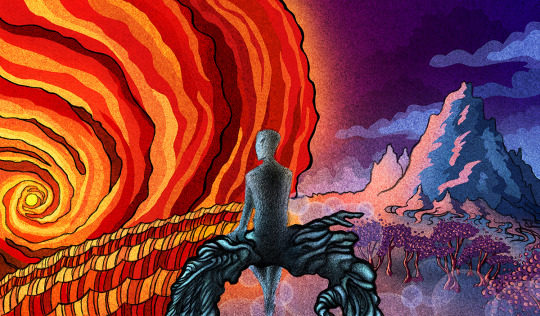
My own piece entitled: 美 which is the Chinese pictogram for “beauty”.
Now let us dig deeper into what I mean. If you recall from Game of Thrones Season 4 where Tyrion tells Jaime the story about their cousin Orson Lannister. He describes how in his simpleness, Orson would crush beetles all the day long, and Tyrion became obsessed with divining why Orson was doing this. He felt there had to be a reason, that there had to be some meaning behind what he was doing. Obviously, this story is an analogy. What Tyrion was really expressing was the aged old question, what does it all mean. I will paste the discussion below:
Tyrion: [...] In any case, I found nothing that illuminated the nature of Orson's affliction or the reason behind his relentless beetles slaughter. So I went back to the source. I may not have been able to speak with Orson, but I could observe him, watch him, the way men watch animals to come to a deeper understanding of their behavior. And as I watched, I became more and more sure of it: there was something happening there. His face was like the page of a book written in a language I didn't understand, but he wasn't mindless, he had his reasons. And I became possessed with knowing what they were. I began spending inordinate amounts of time watching him. I would eat my lunch in the garden, chewing my mutton to the music of "kun kun kun". And when I wasn't watching him, I was thinking about him. Father droned on about the family legacy and I thought about Orson's beetles. I read the histories of Targaryen conquests. Did I hear dragon wings? No, I heard "kun kun kun". And I still couldn't figure out why he was doing it. And I had to know because it was horrible, that all these beetles would be dying for no reason.
Jaime: Every day around the world, men, women, and children are murdered by the score. Who gives a dusty f*** about a bunch of beetles?
Tyrion: I know, I know, but still it filled me with dread. Piles and piles of them, years and years of them. How many countless living, crawling things smashed, dried out, and returned to the dirt? In my dreams, I found myself standing on a beach made of beetle husks stretching as far as the eye can see. I woke up, crying, weeping for their shattered little bodies. I tried to stop Orson once.
Jaime: He was twice your size.
Tyrion: He just pushed me aside with a "kun", kept on smashing. Every day. Until that mule kicked him in the chest and killed him. So what do you think? Why did he do it? What's it all about?
Jaime: I don't know.
This here is a perfect encapsulation of what I have observed in so many of our stories of late, stories which by their very nature are asking that aged old question, what does it all mean. Benioff and Weiss have just expressed it with a heavy hand here, while other writers and artists have a more subtle approach.
To make it clear what I am talking about, I want to draw a parallel between Tyrion’s story and what happened with Daenerys Targaryen. In this story, the audience is Tyrion – we are drawn to the story of Daenerys like Tyrion was drawn to the story of Orson. We were enraptured by her struggles as a character and divining the meaning of her story just as Tyrion sought to know the why of Orsen’s actions with the beetles. I mean isn’t that what we do as fans? We love going online and theorizing with other fans about what is going to happen, why it is going to happen, observing all the details of the plot and character arcs. We love seeking things out!
I cannot remember where I heard it, but it was in something I watched where they pointed out that audiences love to discover things on their own. They like being able to feel like they figured out something, that they found out something the writer had hidden or perhaps may not have been aware of. There is excitement in exploring the story, just as Tyrion was enthralled with understanding the truth and meaning behind Orson’s beetle slaughter. Yet what happened after all of Tyrion’s study, observations, ruminations, and questions? What happened to us the audience when we came to the end of Daenerys’ story? What happened to all that time and effort spent in watching, theorizing, and discussing? Despite Daenerys’ struggle as the underdog in her own story suffering abuse and pain - despite the awe of witnessing dragons coming to life from dormant eggs - despite all the lessons Daenerys learned as a ruler through her mistakes - all of it came to nothing. Just as Tyrion never divined the meaning behind Orson’s senseless slaughter, so we came to the end of Game of Thrones, having gained no beneficial understanding by our journey. Mad Queen Targaryen. Jon kills her. Orson gets killed by a mule. All the world burns. Beetles die for no reason. The End.
Tyrion: So what do you think? Why did he do it? What's it all about?
Jaime: I don't know.
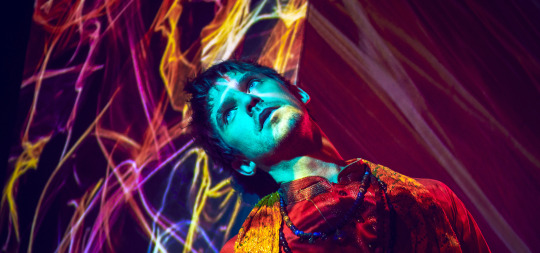
Game of Thrones isn’t the only show with these problems. In the FX show Legion, David Haller, the protagonist of the story, is suddenly twisted to become the show’s villain. He’s been Daenerys Targaryen-ed.

Trish Walker from Jessica Jones Season 3, also Daenerys Targaryen-ed.
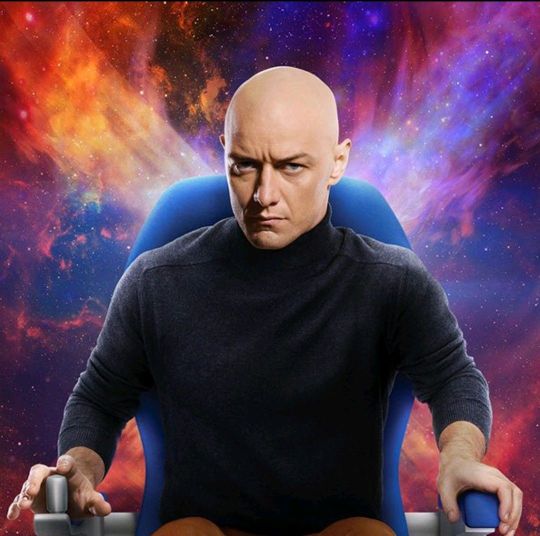
This one is from a movie (it isn’t only in tv shows) and it is a little more subtle, but Professor X in Dark Phoenix was suddenly twisted as this arrogant douche who was controlling and manipulative - the “idol” of the X-Men school brought low. The “idealistic delusion” of Professor X as a heroic leader unveiled to show us the true frailties underneath! *GASP*
As you can see within the very fabric of Benioff and Weiss’s writing, nihilism pervades. It isn’t just in Daenerys’ story, but scattered throughout the stories of Game of Thrones - i.e. how Jaime Lannister went from redemption story to dying under a pile of rocks. Yet not only is nihilism pervading, but it is being romanticized, like there is something profound and powerful in its telling - like we are achieving some enlightened ideal in heralding its tenets. Many storytellers, not just Benioff and Weiss, have become just like that whole scene where Tyrion goes underground and discovers the dead bodies of Jaime and Cersei. Observe how the whole sequence was filmed in excruciating reverence, as we watch Tyrion walk through one ruin to the next. It is is a sobering moment, almost holy in how it is filmed - Tyrion’s silent pilgrimage as he approaches the thing he has dreaded most...
Remember how I mentioned in my previous post that every aspect of the cinematic arts is communicating something? The dialogue, the lighting, the way something is framed, what is shown vs what is not shown, the music, the colors, etc. I would encourage you to rewatch this scene and pay attention to how Benioff and Weiss are wanting you to feel as all these elements are spun together. And when Tyrion does finally arrive, after seeing Jaime’s golden hand amongst the rubble, Tyrion expresses a kind of ritualistic act as he removes the stones one by one, uncovering the truth. Oh, the existential dread! Tyrion weeps and thrashes in the horror and pain of it all! Woe, woe, woe! How powerful, how terrible, how divine!
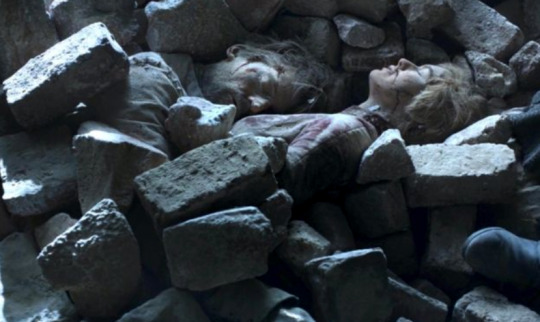
Observe the way Jaime and Cersei are orchestrated here. Despite being crushed by an onslaught of incredibly heavy stones and rocks, they are pictured here in peaceful and reverent positions - something akin to a Renaissance painting. How does that make you feel when you look upon it? The gentle, diffused white light, the atmosphere of ecclesiastical reflection - it is romantic, is it not? It is showing a glorified ideal! Behold the profundity of the nothingness!
Do you see what I mean? There is this glorification of showing the meaninglessness of life, of uncovering “the truth” that this life is full of ugliness and pain, of unmasking our delusions, of showing that there is always “someone behind the curtain”, our idols become monsters, our heroes become villains, it was all a lie, it was all a sick cosmic joke - and this is what empowers us and makes us wise. Oh, look how discerning and insightful we are as we reflect back to you the despair of a twisted humanity!
Me to Writers about how they believe their cynical worldviews are working in their stories:
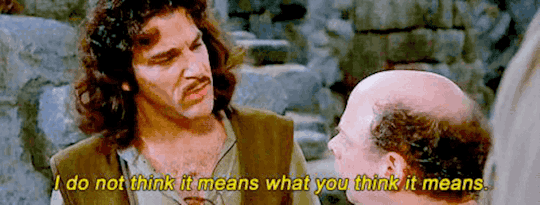
Now, I am not at all saying that stories cannot speak to the ugliness of this world, because there is truth in ugliness. There is pain, suffering, dread, brokenness, disillusionment, bitterness, anger, hate, and a myriad of dark and terrible things. I am not saying we should only tell feel-good stories where everyone lives “happily ever after”. No, what I am pointing out is an attitude that many storytellers have towards that ugliness. All artists have an obligation to speak to all truth, but there is huge difference between telling a story about ugliness vs making making that ugliness seem romantic. There is a difference between showing how life feels arbitrary and meaningless vs saying life is meaningless and arbitrary. There is such a big gap there.
So, I speak to all storytellers now: you are not profound for making statements about the despair of reality. You are not wise. You are not enlightened. It is easy for anyone to despair. It is much more difficult to rejoice in the face of that despair. It is easy to grow in bitterness and disappointment, much more difficult to believe in hope in the face of that disappointment. It is easy to observe ugliness, much more difficult to discern the beauty underneath, within, and despite it. And so that is what it really comes down to – it is easy to write a story like Daenerys “Mad Queen” Targaryen. It is easy to have her twist her own ideals and dreams into the dying screams of a burning city. It is easy to tell a story where someone falls than it is to tell a convincing and realistic story of redemption. It doesn’t require any work – nihilism is the lazy man’s philosophy. If all is meaningless, if nothing truly has any value, than that means you hold no responsibility to anyone or anything. It means you do not have to change the way you are doing things, that you can coast, lay back, and just watch the world burn. You can pat yourself on the back for being “woke” and not falling for the opiates of the masses. You don’t have to do any soul searching. You do not have analyze your own world view or assumptions. You don’t have to work at trying to understand what life truly means or try to find the purpose amidst all the chaos. There is no truth except the truth of nothing, therefore you are free to do nothing without guilt or shame. Nihilism is one big fat existential cop out!
Therefore, I say to all artists, storytellers, writers, showrunners, and creators – stop dishing out this crap for audiences to eat and get off your lazy asses and get to work!
26 notes
·
View notes
